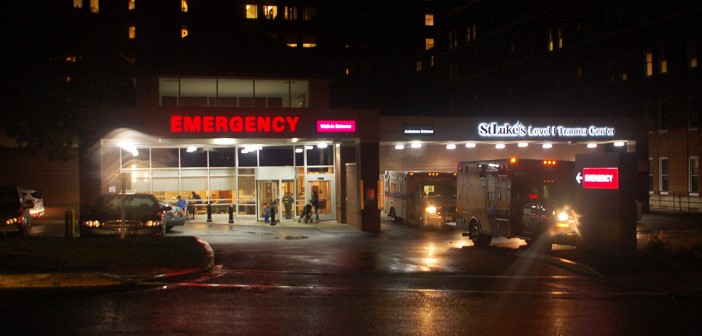Unclear language in Lehigh’s Medical Amnesty Policy has perpetuated misconceptions about the details of the policy, resulting in student hesitation to call for help in alcohol-related emergencies.
It’s no secret that underage drinking is prevalent on college campuses. According to the National Institute on Alcohol Abuse and Alcoholism website, almost half the college students who drank in the past month engaged in “binge drinking,” and approximately 1,825 students “die from alcohol-related unintentional injuries” in the U.S. every year.
As a precautionary measure, universities across the country have adopted medical amnesty policies to encourage students to call for help without fear of repercussions in the event of a true emergency, and Lehigh is no exception.
According to the Students for Sensible Drug Policy website, medical amnesty policies “are life-saving measures that enable people to make responsible decisions by shielding them from punishment when they call for medical help during an emergency relating to alcohol or other drugs.”
However, what may be a secret to many students on campus are the true implications of the Lehigh Medical Amnesty Policy.
Lehigh’s Medical Amnesty Policy clearly states that a person seeking help for an intoxicated individual will be protected from the repercussions of violating the Lehigh Student Code of Conduct. It also states that if an intoxicated individual seeks medical attention for him- or herself, they, too, will be protected from violating the code of conduct. What it neglects to state is the level of protection of an intoxicated student in the event that someone else seeks help for them.
Additionally, even if a student is granted medical amnesty, the policy says it will not protect the student from legal consequences.
The policy, as worded, does not specifically ensure the protection of the intoxicated minor, which students may expect to be the purpose of medical amnesty. As a result, some students on campus have a misconception about who is protected by the policy and may be reluctant to call for help in the event of an emergency.
According to Lehigh Police Chief Edward Shupp, there was not a noticeable increase in 911 calls when Lehigh’s Medical Amnesty Policy was instated in 2007. He said he thinks some students don’t grasp the policy because they’re worried that their friend may get arrested if they call for help.
Although Lehigh’s Medical Amnesty Policy will typically protect students from charges against violating the code of conduct, students may still receive a citation from the Lehigh University Police Department for underage drinking because medical amnesty has no relation to LUPD and because police are dispatched when emergency medical attention is requested.
“Sometimes medical amnesty is very unclear,” said Ali Fotinopoulos, ’17, a Gryphon in Richards House. “I don’t think residents understand the point of medical amnesty because either way, they’re going to get written up. I still don’t really understand it.”
According to Lehigh’s Greek Eligibility Policy, “students who have been found responsible for violations of the Lehigh University Code of Conduct involving hard alcohol or that have been found responsible for ‘serious offenses with alcohol or drugs’ will not be permitted to join a fraternity or sorority in the semester the violation occurs or the following semester.”
In the spring of 2014, 40 percent of males and 44.7 percent of females on campus were involved in Greek life, according to the Fraternity and Sorority Statistics and Trend Analysis. At a school with such a prominent Greek community, losing rush privileges may be a significant punishment for some students. The policy’s failure to specify that the student for whom help is called will be protected, combined with this punishment, could potentially deter students from calling for help in the event of an emergency.
A female student in the class of 2018, who asked to remain unnamed, recounted the night when she needed to call for medical assistance for her intoxicated roommate.
“All I was thinking about at the time was trying to help her, and I was hoping she wouldn’t be mad at me for calling and ruining her chances of rushing,” she said. “She’s obviously not mad, and she’s happy and thankful I made the right decision.”
Chris Mulvihill, Associate Dean of Students, said he thinks 18- to 22-year-old students don’t want to get themselves or their friends in trouble, and sometimes they are more worried about that than calling for help.
Mulvihill said he doesn’t know what Lehigh can do to make the policy more lenient.
“I think it’s reasonable, manageable and in line with what other institutions do with medical amnesty,” Mulvihill said. “It may be different in wording, but it’s generally how these policies are written.”
In contrast to Lehigh’s Medical Amnesty Policy, the medical amnesty policy at Cornell University, also known as Good Samaritan Protocol, explicitly states that judicial consequences are eliminated for the intoxicated student for whom assistance is sought.
Similarly, the medical amnesty policy at Tulane University also specifically states that “a student in need of medical attention will not be subject to student conduct charges” for unauthorized use of drugs or alcohol.
“The reason it’s not mentioned is because it’s already covered,” Mulvihill said of Lehigh’s policy. “If someone calls for you or you call for yourself, you’re covered.”
Tim Wilkinson, senior assistant dean of students and director of Fraternity and Sorority Affairs, said that no matter how Lehigh’s Medical Amnesty Policy is worded, there will inevitably be miscommunication, and that even if it were to be rewritten, there would still be people who challenge it.
Despite the fact that the policy fails to specify that intoxicated students will be protected in the event that someone calls for assistance for them, school administrators said they designed the policy to protect students, and those who utilize it will typically not be charged with violating the code of conduct.
“If someone needs help and calls for themselves or someone else, neither of those students will be held responsible for violations of the code of conduct,” Mulvihill said. “No disciplinary record is generated, and no primary sanctions are put in place.”
Lehigh’s Medical Amnesty Policy says “this policy only provides amnesty from violations of the Lehigh University Code of Conduct. It does not grant amnesty for criminal, civil, or legal consequences for violations of federal, state, or local law.”
Shupp said a student who seeks medical assistance might still receive a citation because the minor has committed a crime by drinking while underage.
“No one forced them to consume alcohol,” Shupp said.
He said by calling for help, students are taking up the time of doctors and everyone involved. If medical amnesty were to protect the intoxicated student from full ramifications, there would be no punishment, and the student may be encouraged to do it again.
However, Shupp said that this should not deter a student from seeking help for a friend.
“If they’re concerned about their friend, they shouldn’t be concerned about the ramifications,” he said. “Is it better to have their friend alive and face an underage drinking citation or to have them dead?”
A sophomore student who wished to remain anonymous said that, when her roommate sought out medical attention for her due to intoxication, her roommate called 911 for help, and she was issued a citation by LUPD. However, she was permitted to rush the following semester because she had been granted medical amnesty. Although initially cited, she was eventually able to have it removed when she completed accelerated rehabilitative disposition classes.
Fotinopoulos said she doesn’t think students understand Lehigh’s Medical Amnesty Policy.
“They never want the cops involved,” she said. “As a freshman, my friends would never want the Gryphon involved when they were throwing up because they knew it would be documented. It made me feel uncertain and afraid to rely on my Gryphon if I needed professional attention and help.”
Despite the different ways Lehigh’s Medical Amnesty Policy can be interpreted, Wilkinson said it is designed to protect students from violations of the Lehigh University Code of Conduct.
“We acknowledge students are going to drink and students are learning to drink,” Wilkinson said. “We fear when students think they can’t get help. Taking care of each other is always what we care about the most.”






Comment policy
Comments posted to The Brown and White website are reviewed by a moderator before being approved. Incendiary speech or harassing language, including comments targeted at individuals, may be deemed unacceptable and not published. Spam and other soliciting will also be declined.
The Brown and White also reserves the right to not publish entirely anonymous comments.